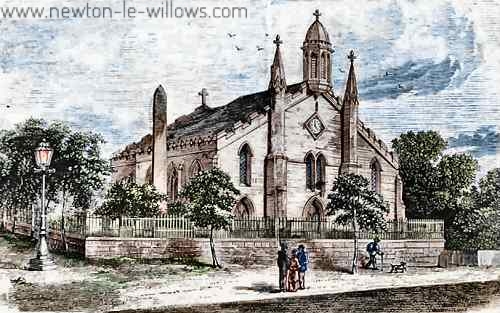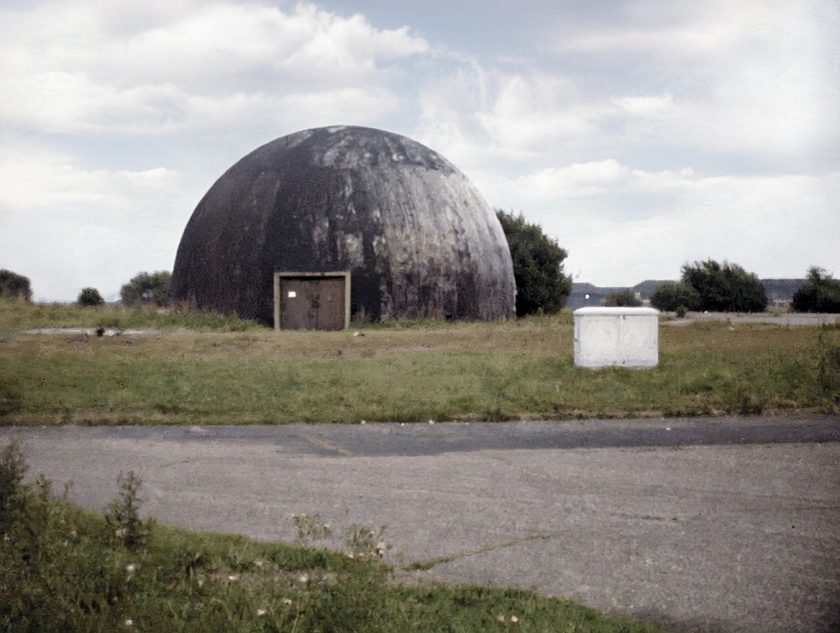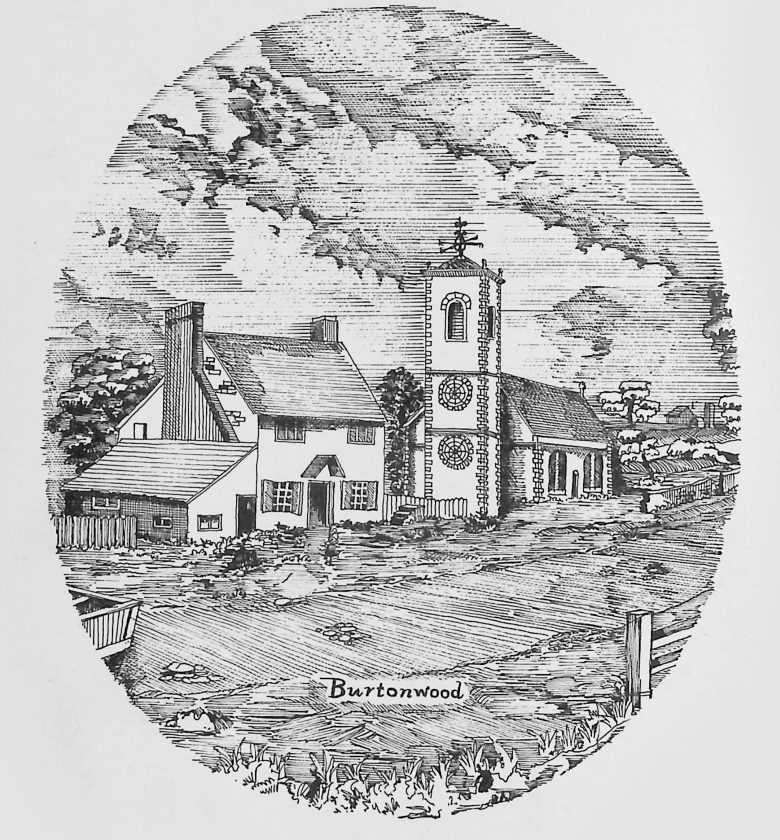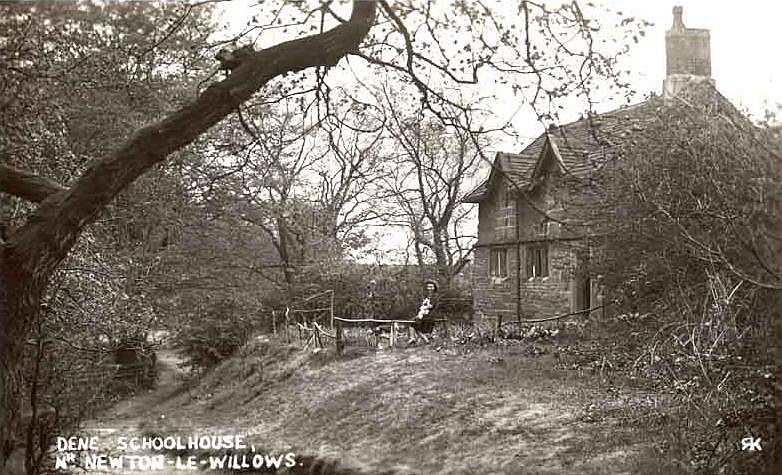NEWTON IN MACKERFIELD.
NEWTON IN MACKERFIELD is a small Borough Town and Chapelry in the Parish of Winwick, and in the Hundred of West Derby; 5 miles N. of Warrington, and 7 miles S. of Wigan.
This Borough contains 275 houses, occupied by 289 families, consisting of 1643 persons. Of these families 56 are employed chiefly in agriculture, 221 in trade,” manufactures, or handicraft, and the remaining 13 are either engaged in professional pursuits or unemployed.
The rental of the lands, messuages, and other buildings in the township, according to the estimate. for the county rate, amounts to £6202.
This place was described nearly three hundred years ago by Leland,. as ” Newton on a brooke, a litle poore market, whereof Mr, Langton hath the name of his Barony. Sir Perse Lee, of Bradley, hath his place at Bradley,* in a park 2 miles from Newton.” (The moat and ancient getaway of Bradley-hall still remain.).
The market which was held on Saturday, has now fallen into disuse, and the barony is extinct, though the Court Baron is still held here, and small debts have been recovered under its jurisdiction within a few years.
Edward the Confessor was Lord of Newton, the barony of which passed successively to Roger de Poictou, and the Langtons. From documents of the date of 2d Edw. I. and 2 Edw. II. it appears that Sir John Langton obtained the wardenship of Alice, daughter and heiress of James Banister, Lord of Walton-le-dale, whom he afterwards married. Both the Barony of Newton, and the Lordship of Walton, remained in the family of Langton, till the 32d Elizabeth, when Thomas Langton, that year the High Sheriff of the County of Lancaster, then in the 62d year of his age, slew Thomas Hoghton, of Hoghton Tower, Esq. in a rencontre at Lea, near Preston, and, to make his peace with the Hoghton family, settled on them the manor of Walton, “for a term of years”. Says the Lancashire MS. book of pedigrees, “but the possession was kept in perpetuity.”
Newton still retains so much of its former dignity, that, it returns, two members to Parliament, in virtue of the, ancient barony ; it is not however, amongst the number of early boroughs, for the elective franchise has not existed here longer than since the first year of the reign of Queen Elizabeth.
William Shippen, Esq. one of the representatives. of the borough in 1717, was committed to the tower for reflecting on the,kings speech (George I.) when the House was in a committee of supply, the honourable member having said, “that the second paragraph of the speech seemed rather to be calculated for the meridian of Germany, than of Great Britain, and that the king was a stranger to our language and Constitution.” Of this member the story is told, which is more correctly, related of Andrew Marvel, that he secured his independence by limiting. his wants, and that he made three dinners of a shoulder of mutton.
The right of election for the borough of Newton is exclusively vested in the freemen or burgesses of the borough, that is, of any person Possessing a freehold estate in the borough of the value of forty shillings a year or upwards, of whom the number is at present about 60.
Thomas Legh, Esq. of Lyme Park, in Cheshire, and of Haydock Lodge and Golborne Park, in this parish, and Sir Robert Townshend T. Farquhar, Bart. are the present representatives.
The returning officers are, the steward of the borough, and bailiff of the manor. These officers hold a Court Baron and Court Leet in the months of April, May, and October, and in them is vested the government of the borough.
Thomas Legh, Esq.. is the present Lord of the Manor, the property of which his family acquired by purchase about two centuries ago.
Some idea of the former importance of the borough may be found from the great extent of the fee of Mackerfield, which is incident to the manor, and which extends over the adjacent townships of Lowton, Golborne, Haydock, Ince, Pemberton, Billinge, Winstanley, Orrell, Hindley; Abram, Kenyon, Ashton, Southworth with Croft, Houghton, Middleton and Arbury, Woolston with Martinscroft, and Poulton with Fearnhead ; the freeholders within which townships owe suit and service at the Courts Leet, which are held for the borough and manor of Newton and fee of Mackerfield.
The bailiffs of Wigan also owe suit and service there, and are in the suit roll.
There is here a free school, the endowment of which is about £50 a year; the Rev. John Sedgwick is the master, and the school, like the chapel of Newton, is in the patronage of Thomas Legh, Esq..
The town consists principally of one broad street.
The sports of the turf and of the cockpit formerly prevailed in this borough to a considerable extent; but in the year 1816 they were discontinued, or rather suspended, for it is now announced that Newton races are to be resumed in the year 1825, and held this year, and in future years, the first week after the Manchester races.
There are also two fairs held yearly, namely, on the 17th and 18th of May, and the 11th and 12th of August.
There are several very ancient houses in the township. The Old Hall and the Oak-tree House, both built of wood, and situated at opposite extremities of the borough, are worthy of notice.
Adjoining to the Old Hall is a small rising ground, formerly surrounded by a moat, and tradition represents that it was once a royal residence.
At the distance of half a mile from and to the N. of Newton, stands -ancient barrow, called Castle-hill. It is romantically situated, on elevated ground, at the junction of two streams, whose united waters form the brook which flows past the lower part of the town of Newton. The sides and summit of the barrow are covered with venerable oaks, which, to all appearance, have weathered the rude and wintry blasts of centuries. It is a spot well adapted for the repose of the ashes of the mighty dead. The barrow is about twenty-five yards in diameter, and from eight to nine yards in height.
On the 24th of July, in the year 1822, a whetstone, encased in wood, in a state of decay, was found by two colliers, about 30 yards below the surface, while they were sinking a coalpit, two miles to the north of Newton. The strata above it were afoot of brown soil, four feet of red clay, five feet of red book leaf marl, 74 feet of toad-back marl, and six feet of grey quicksand, in which the whetstone was found, being part of a bed of sand 17 yards deep. All the gravel in the quicksand was mixed with round pieces of coal, and both the marl above the whetstone and the gravel below it contained oyster and other sea-shells. No other coal-pit had been sunk within a hundred yards of this place, nor is any stone of this kind found in the neighbourhood, and the probability is, that the whetstone has remained in the quicksand as long as the sea-shells, which were found above and below it.
This relic of other times is in the possession of the Rev. Peter Legh, incumbent of the Parochial Chapel of Newton, to whom we are indebted for the communication of these interesting facts. Upwards of a century before a whetstone was discovered in a morass, some distance from Martin Meer, and with it am Instrument of mixed metal resembling in form the Roman securis, or sacrificing axe.
The country is flat, but fertile, and the soil is partly a strong and partly a sandy loam. To the west of Haydock Lodge, there is a small tract that has almost the tenacity of clay.
The Parochial Chapel was built at the expense of Richard Legh, Esq. in the year 1682. It is dedicated to St. Peter, and is in the patronage of Thomas Legh, Esq. who a few years ago enlarged the chapel yard, and erected, at his own expense, the present handsome stone wall, and iron palisades, which enclose it. The Rev. P. Legh,. M. A. is the present incumbent.
The amount of the expenditure of Newton, in the year 1824-25, in support of the poor, the constables account, and county rate, was £840 17s 5 1/2d. ;- of which sum £146. was paid for the county rate; £66. 8s. for law expenses ; and £14. 18s. to the mole catcher!
Upwards of 400 children are educated at the Church Sunday-schools, established in the year 1823.
The public buildings are an ancient courthouse, and a handsome assembly-room.
POST OFFICE–
Horse and Jockey Inn. – Letters are received from Warrington daily, at 8 mg. and despatched at 1/2 past 5 aft.
Legh Rev. Peter, A.M. Curate & Magistrate, Golhorne Park
Benson Richard, gent.
Berry James, gent.
Howard John, gent.
Mather John, surgeon
ACADEMIES.
Sedgwick Rev. J. Free School Shearson Mary, (Boarding)
BLACKSMITHS.
Bradshaw James
Riley William
BOOT & SHOE MAKERS.
Gorse James
Hall Wiiliam
Shaw Peter
CORN DLRS. & MILLERS.
Houghton Thos. (and maltster) Peters Geo. Red Bank Mill
COTTON SPINRS. & MFRS.
Allen Jas. & Sons
Armstrong John (fustian)
Edwardson Peter
Leather Peers
Smith, Sawden & Co. (and Warrington)
FARMERS.
Bate Ambrose, Crow lane B
arnes Hugh, Crow lane
Boardman Thos. Old Hall
Dearden Richard, Pepper alley
Ellam John, (and butcher)
Grice Ambrose, Park side
Halton John, Tan house
Houghton M. & E. Wagry Moss
Kelsall John, Old-hey
Lawson Sarah, Coalpit lane
Mason Roger, Buff-house
Mather John, Barrom lane
Naylor Wm. Common
Pennington Henry
Pennington John, Woods head
Pemblet William
Rigby John, Park side
Sixsmith Ralph, Park
Wright Wm. New-key
INNS AND TAVERNS.
Blue Bell, Wm. Leather
Blue Lion, James Molineux
Bull Inn, John Hamer
Bulls Head, Henry Glover, Golborne dale
Greyhound, Ellen Naylor, Common
Horse & Jockey Inn, Chas. Steel
Millstone, Miriam Leigh
Red Lion, Henry Smith
Royal Oak, Peter Forshaw
Swan, John Smiley, Common
White Lion, John Gaskell
LINEN & WOOLLEN DPRS.
Johnson Mary
Leather Peers
SHOPKEEPERS.
Bagshaw Elizabeth
Barrow Mary
Barrow Margaret
Gutridge Leo
Owen Richard, (overseer)
WHEELWRIGHTS.
Bagshaw, Samuel
Pilling George
MISC
Appleton John, tailor
Dixon Thos. excise officer
Hall Thomas, bailiff
Hamer Henry, manufacturer
Hamer James, auctioneer
Heaton John, Guardian of the Poor, Wagry Moss
Houghton Geo. Chapel Clerk
Johnson John, cooper
Pickton Robert, joiner
Unsworth Peter, saddler
COACHES FROM THE HORSE & JOCKEY
To LIVERPOOL every mg. at 8, &
To BoLTON every evg. at 1/4 p. 6.
COACHES FROM The BULL INN.
To LiverpoolL at 1/2 p. 4 aft. &
To BoLToN, Bury, Rochdale, &Leeds, at 9 morning daily.
A Market Coach to Warrington every Wed. at 9 mg. and to Wigan same evg. at J past 5.
A Coach to Warrington, every Wed. at 9 mg. and to Bolton same evg. J past G.
CARRIER.
John Hargreaves, (from the Bull) daily to Wigan, at 4 aft. & to Warrington at 3 p. 8 night; and Goods forwarded by J. H. to all parts of the kingdom.
Transcribed by myself from the Lancashire Baines Directory 1824-5
thanks goto Newton Library staff, for their patience in hunting research details for me.
(c) copyright 2003 : Steven Dowd – www.newton-le-willows.com
feel free to use this text for any educational, personal or non-commercial purposes




